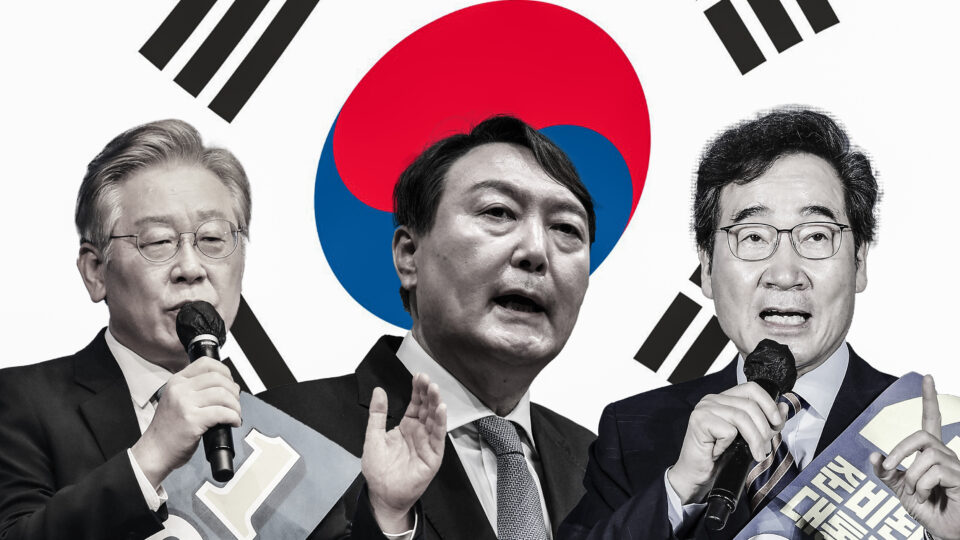TAIPEI, Taiwan – The final televised presidential debate ahead of South Korea’s June 3 election was dominated by fierce scrutiny over the leading candidate from the Democratic Party Lee Jae-myung’s alleged involvement in illegal cash transfers to North Korea.
The topic took center stage during the foreign policy and national security portion of the debate, when Lee underscored the importance of dialogue and peaceful coexistence with Pyongyang. Stressing that South Korea’s defense budget is double that of the North’s, he argued for diplomacy.
However, his remarks provided an opening for conservative rival Kim Moon-soo of the People Power Party and centrist Lee Jun-seok of the New Reform Party, who launched coordinated attacks highlighting Lee’s alleged “North Korea risk.”
Kim accused Lee of being at the center of a scandal involving illegal funds sent to North Korea.
“Despite U.N. sanctions, the issue of illegal remittances to the North have surfaced. On May 9, president of the Korean American Association in Washington officially filed a complaint with the U.S. Treasury, State Department, and U.N. Security Council, accusing Lee of secretly transferring 10 billion South Korean won (US$8 million) to North Korea,” said Kim.
South Korean prosecutors allege that between 2019 and 2020, during his tenure as governor of Gyeonggi Province, Lee directed the Ssangbangwool Group to transfer US$8 million to North Korea, including US$5 million intended for a smart farm project and US$3 million to facilitate a prospective visit by Lee to Pyongyang.
Lee’s former deputy governor, Lee Hwa-young, was convicted and sentenced to nine-and-a-half years in prison for his involvement in the scheme, which encompassed bribery and unauthorized fund transfers to North Korea.
Lee denies any wrongdoing and says the charges are politically motivated.
He contends that the prosecution’s case lacks merit and is an attempt to undermine his political career. The case is ongoing.
“That money is now feeding the Kim family and returning to us as nuclear threats. I will pursue a transparent and upright inter-Korean relationship,” Kim said.

Lee Jun-seok followed up by questioning Lee about his campaign pledge to relocate shipping giant HMM’s headquarters to the city of Busan.
When Lee identified HMM’s predecessor as Hyundai Merchant Marine, Lee Jun-seok pointedly noted that the company had once engaged in North Korean projects that cost it some $200 million – an affair that many would consider a major scandal today.
“Regardless of domestic court rulings, the Ssangbangwool remittance case could make Lee subject to U.S. sanctions. Even if he becomes president, U.S. immigration law Section 212 could bar his entry,” said Lee Jun-seok.
Lee pushed back during the debate.
“The cash transfer had nothing to do with me. There are even rumors the funds were used for gambling after stock manipulation investigations began. I believe the truth will be revealed,” he argued.
While the allegations dominated the evening, Lee found some support from Kwon Young-guk of the Democratic Labour Party. Kwon criticized North Korea’s psychological provocations along border areas and highlighted residents’ suffering.
“I completely sympathize. Taking a hardline stance alone isn’t the solution,” Lee said.
Lee previously said he believed the current strategy toward the North has tipped too far toward confrontation.
Relations between the two countries since the end of the 1950-53 Korean War have waxed and waned for decades between unremitting hostility and attempts at rapprochement.
While acknowledging the “hostile” nature of current inter-Korean relations, he argued in multiple media interviews that South Korea’s strong military and alliances – particularly with the U.S. and Japan – already provide sufficient deterrence.
Instead, he insisted on “communication and engagement” with the North, signaling a return to the approach of previous Democratic Party governments.
On broader foreign policy, the candidates diverged. Lee reiterated support for the U.S.-South Korea alliance but warned against unnecessary hostilities with China and Russia.
“We must not overlook the relationship between China and Russia, and there is no need to be unnecessarily hostile as we are now,” said Lee.
Critics of Lee have accused him of adopting a “subservient” stance toward China.
Lee stirred controversy during his 2022 campaign by saying: “Why do we care what happens to the Taiwan Strait? Shouldn’t we just take care of ourselves?”
He later clarified that his point was about diplomatic pragmatism and that South Korea should avoid worsening relations with China.
Kim called for strengthening nuclear deterrence under the U.S. alliance, while Lee Jun-seok proposed merging the Foreign and Unification Ministries and appointing a “Deputy Prime Minister for Security.”
Kwon Young-guk went further, vowing to “engineer the moment the U.S. and North Korea establish diplomatic relations.”
A Wednesday survey from Realmeter, a South Korean polling organization, showed support for Lee at 49.2%, followed by Kim with 36.8%. The margin of error was 3.1% points at a 95% confidence level. Lee Jun-seok was running third with 10.3% support.
The poll serves as the final indicator of voter sentiment because the publication of opinion polls will be banned from Wednesday under election law.
Edited by Mike Firn.




